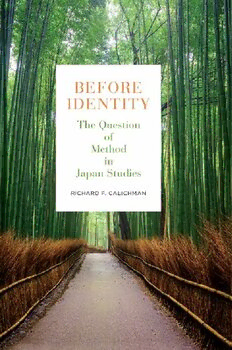Table Of ContentBEFORE
IDENTITY
BEFORE
IDENTITY
The Question
of
Method
in
Japan Studies
RICHARD F. CALICHMAN
Published by State University of New York Press, Albany
© 2021 State University of New York
All rights reserved
Printed in the United States of America
No part of this book may be used or reproduced in any manner whatsoever
without written permission. No part of this book may be stored in a retrieval system
or transmitted in any form or by any means including electronic, electrostatic,
magnetic tape, mechanical, photocopying, recording, or otherwise without the prior
permission in writing of the publisher.
For information, contact State University of New York Press, Albany, NY
www.sunypress.edu
Library of Congress Cataloging-in-Publication Data
Name: Calichman, Richard, author.
Title: Before identity : the question of method in Japan studies / Richard F. Calichman.
Description: Albany, NY : State University of New York Press, Albany, 2021. |
Includes bibliographical references and index.
Identifiers: LCCN 2020045640 (print) | LCCN 2020045641 (ebook) | ISBN
9781438482132 (hardcover : alk. paper) | ISBN 9781438482156 (ebook)
Subjects: LCSH: Japan—Study and teaching. | Education—Philosophy. |
Identity (Philosophical concept) | Kafka, Franz, 1883–1924.
Classification: LCC DS806 .C275 2021 (print) | LCC DS806 (ebook) | DDC
952.0072—dc23
LC record available at https://lccn.loc.gov/2020045640
LC ebook record available at https://lccn.loc.gov/2020045641
10 9 8 7 6 5 4 3 2 1
Contents
Acknowledgments vii
Introduction 1
Chapter 1 Remembering Kafka: Between Murakami Haruki and
Komori Yōichi 9
Chapter 2 The Double Pull of History and Philosophy:
Reading Harootunian 57
Chapter 3 The Question of Subjectivity in North American
Japanese Literary Studies 107
Coda Some Brief Remarks on Responsibility 181
Notes 189
Bibliography 209
Index 215
Acknowledgments
For some time, the process of writing a book has been like swimming
underwater: the experience is at once pleasurable and frightening, and one
yearns for the moment when one can finally resurface and recommence
one’s relationship with the far less demanding element of oxygen. Now that
I have arrived at such a moment, I must attend to academic protocol and
thank publicly those whose gifts and kindnesses I cherish primarily privately.
Friends and colleagues whose insights have helped improve this manuscript
include: Michael Bourdaghs, Pedro Erber, Mayumo Inoue, Ted Mack, Cliff
Rosenberg, and Atsuko Ueda. I would also like to give particular thanks to
Jon Solomon: the years have brought distance and differences, but many
of the thoughts expressed in the following pages originated from our past
discussions. Parts of the work were delivered as a conference paper at Cornell
University in 2017 and as a public lecture at the University of Chicago in
2018, and I am grateful to Joshua Young and, again, Michael Bourdaghs
for organizing these events.
At SUNY Press, I have been extremely fortunate to receive the help
of Christopher Ahn and James Peltz. I am also indebted to the two anony-
mous readers whose perceptive comments encouraged me to rethink certain
aspects of my argument.
The book is dedicated to Naoki Sakai: with respect and gratitude.
vii
Introduction
In the following pages, I attempt to set forth what might be considered
a divergent or dissenting approach to Japan studies, one primarily con-
cerned with the question of method rather than the more traditional focus
on objects. It must be immediately added, however, that there is nothing
unique about either Japan or Japan studies that would prevent my remarks
from conceivably being applied to other branches of area studies as well.
The study of area is typically established on the basis of the unit of the
individual nation-state—e.g., French studies, China studies, etc.—and this
national unity is given substance by appeal to a unified people, culture,
and language. This very division of knowledge, I contend, is intrinsically
nationalistic. Regardless of whether the individual scholar comes to treat the
problem of nationalism, his or her participation in the discourse of area
studies already reinforces the overall sense of national oneness. In order to
examine the root of this problem, attention must be directed to the general
manner in which difference and identity are conceived and institutionally
organized. With particular focus on the region of area studies known as
“Japan,” I aim to show that our thinking of such sites must be placed on
a more rigorously critical footing.
How, then, might one contribute to the formation of a critical Japan
studies? This is the question that motivates the writing of this book. As
goes without saying, such a question did not arise out of thin air; on the
contrary, it is ineluctably a response to the dynamics of the North American
field of Japan studies that I have witnessed and participated in for nearly
two decades now. Certainly there is much to commend about the current
scholarship in this field, and there can be little doubt that the discipline as
a whole has continued to evolve in such a way as to become more critically
self-conscious and finely attuned to the politicality inherent in any project
of knowledge. A glance at recent publications in the major subfields of
1

